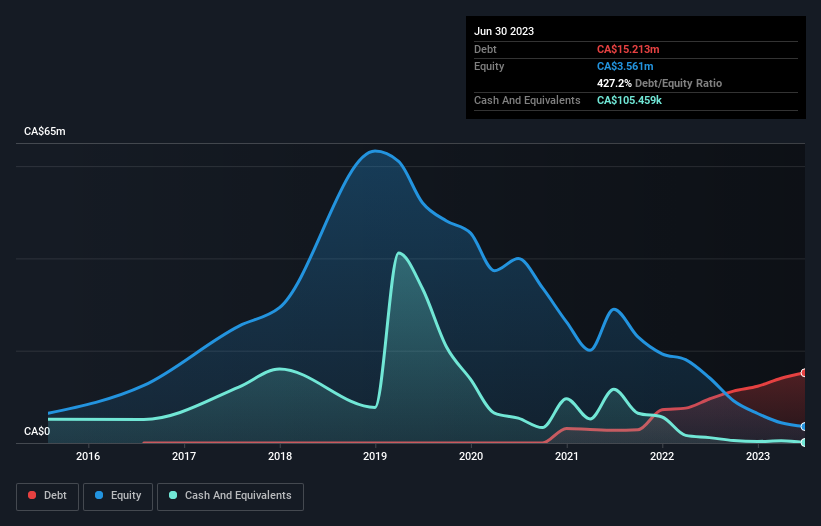
Howard Marks put it nicely when he said that, rather than worrying about share price volatility, 'The possibility of permanent loss is the risk I worry about... and every practical investor I know worries about.' So it seems the smart money knows that debt - which is usually involved in bankruptcies - is a very important factor, when you assess how risky a company is. As with many other companies PharmaCielo Ltd. (CVE:PCLO) makes use of debt. But should shareholders be worried about its use of debt?
When Is Debt A Problem?
Generally speaking, debt only becomes a real problem when a company can't easily pay it off, either by raising capital or with its own cash flow. Part and parcel of capitalism is the process of 'creative destruction' where failed businesses are mercilessly liquidated by their bankers. While that is not too common, we often do see indebted companies permanently diluting shareholders because lenders force them to raise capital at a distressed price. Of course, debt can be an important tool in businesses, particularly capital heavy businesses. When we examine debt levels, we first consider both cash and debt levels, together.
View our latest analysis for PharmaCielo
What Is PharmaCielo's Net Debt?
You can click the graphic below for the historical numbers, but it shows that as of June 2023 PharmaCielo had CA$15.2m of debt, an increase on CA$9.54m, over one year. And it doesn't have much cash, so its net debt is about the same.

A Look At PharmaCielo's Liabilities
According to the last reported balance sheet, PharmaCielo had liabilities of CA$7.68m due within 12 months, and liabilities of CA$14.6m due beyond 12 months. Offsetting these obligations, it had cash of CA$105.5k as well as receivables valued at CA$1.02m due within 12 months. So it has liabilities totalling CA$21.1m more than its cash and near-term receivables, combined.
This deficit is considerable relative to its market capitalization of CA$32.5m, so it does suggest shareholders should keep an eye on PharmaCielo's use of debt. Should its lenders demand that it shore up the balance sheet, shareholders would likely face severe dilution. There's no doubt that we learn most about debt from the balance sheet. But it is PharmaCielo's earnings that will influence how the balance sheet holds up in the future. So if you're keen to discover more about its earnings, it might be worth checking out this graph of its long term earnings trend.
Over 12 months, PharmaCielo made a loss at the EBIT level, and saw its revenue drop to CA$2.9m, which is a fall of 29%. To be frank that doesn't bode well.
Caveat Emptor
While PharmaCielo's falling revenue is about as heartwarming as a wet blanket, arguably its earnings before interest and tax (EBIT) loss is even less appealing. Indeed, it lost a very considerable CA$11m at the EBIT level. Considering that alongside the liabilities mentioned above does not give us much confidence that company should be using so much debt. So we think its balance sheet is a little strained, though not beyond repair. However, it doesn't help that it burned through CA$6.5m of cash over the last year. So suffice it to say we consider the stock very risky. The balance sheet is clearly the area to focus on when you are analysing debt. But ultimately, every company can contain risks that exist outside of the balance sheet. For example PharmaCielo has 5 warning signs (and 1 which shouldn't be ignored) we think you should know about.
If, after all that, you're more interested in a fast growing company with a rock-solid balance sheet, then check out our list of net cash growth stocks without delay.
New: Manage All Your Stock Portfolios in One Place
We've created the ultimate portfolio companion for stock investors, and it's free.
• Connect an unlimited number of Portfolios and see your total in one currency
• Be alerted to new Warning Signs or Risks via email or mobile
• Track the Fair Value of your stocks
Have feedback on this article? Concerned about the content? Get in touch with us directly. Alternatively, email editorial-team (at) simplywallst.com.
This article by Simply Wall St is general in nature. We provide commentary based on historical data and analyst forecasts only using an unbiased methodology and our articles are not intended to be financial advice. It does not constitute a recommendation to buy or sell any stock, and does not take account of your objectives, or your financial situation. We aim to bring you long-term focused analysis driven by fundamental data. Note that our analysis may not factor in the latest price-sensitive company announcements or qualitative material. Simply Wall St has no position in any stocks mentioned.
About TSXV:PCLO
PharmaCielo
Together with its subsidiary, engages in cultivating, processing, and supplying medicinal-grade cannabis extracts in Canada.
Moderate with weak fundamentals.
Similar Companies
Market Insights
Community Narratives




